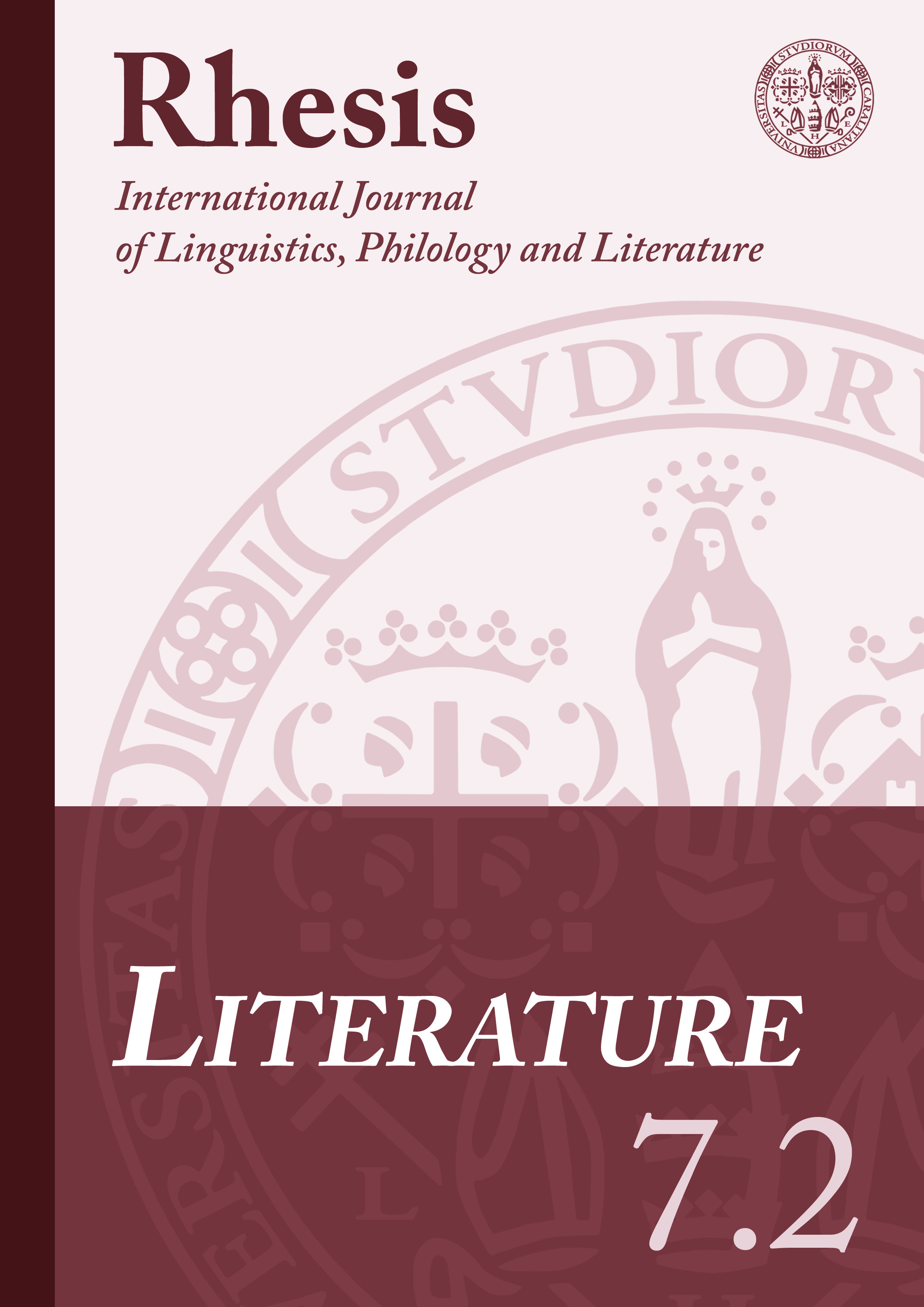At War with Mothers, Male Ego and their Words: Woolf’s Mrs. Dalloway and Lessing’s The Golden Notebook
Abstract
This paper concerns the analysis of the female identity in the Western world at the beginning of the twentieth century as constructed in the works of Virginia Woolf and Doris Lessing. Focusing the attention on the collapse of Western societies during the two World Wars, this study highlights the crisis of traditional patriarchal structures and the resulting emerging of new literary perspectives opposed to this system. Woolf and Lessing scrutinized the deep impact of social fragmentations on women’s identity by unveiling the failure of the patriarchal dominant society. Specifically, an attentive reading of the two novels Mrs Dalloway (1925) and The Golden Notebook (1962), is offered as an example of the de construction of a dominant patriarchal language. The entire analysis is founded on the postulate that European women constituted for centuries a subculture developed under the shadow of patriarchy, and that in this context the portrayals offered by Woolf and Lessing should be considered as a significant achievement for women writing. On the basis of these examinations, it is concluded that the fragmented female identity drawn by the two authors represents the attempt to dismantle the overwhelming presence of a predominant patriarchal perspective during the two war times in Western societies.
Downloads
References
ATWOOD, Margareth, “Doris Lessing: a model for every writer coming from the back of beyond”, «The Guardian», Monday 18 November 2013,
BENJAMIN, Sararel, “Masculinisation of the State and the Feminisation of Poverty”, «Empowering Women for Gender Equity», 48 (Globalisation: Challenging Dominant Discourses) (2001), pp. 68-74.
BONDI, Liz, “In Whose Words? On Gender Identities”, «Knowledge and Writing Practices, Transactions of the Institute of British Geographers», New Series, 22.2 (1997), pp. 245-258.
BROWN, Carol A., “Patriarchal Capitalism and the Female-Headed Family”, «Social Scientist», Special Number on Women, 4.4/5 (1975), pp. 28-39.
CHRISTENSEN NELSON, Carolyn, Literature of The Women’s Suffrage Campaign in England, Canada, Broadview Press, 2004.
FORBES, Shannon, “Equating Performance with Identity: the Failure of Clarissa Dalloway’s Victorian “Self” I Virginia Woolf’s Mrs. Dalloway”, «The Journal of the Midwest Modern Language Association», 38.1 (Special Convention Issue) (2005), pp. 38-50.
HAZELTON, Leslie, “Doris Lessing on Feminism Communism and ‘Space Fiction’”, «New York Times», 25 July 1982
HENDERSON, Sandra, “This Preposterous Masculine Fiction: Virginia Woolf and the Intellectual History of the Great War”, «San Francisco State University Journal Archive», 16 (2013), pp. 1-12.
IRIGARAY, Luce, This Sex which is Not One, New York, Cornell University Press, 1983 [2nd edition].
KEGAN GARDINER, Judith, “On Female Identity and Writing by Women”, «Critical Inquiry», Writing and Sexual Difference, 8.2 (Winter 1981), pp. 347-361.
KEGAN GARDINER, Judith, “Doris Lessing’s The Golden Notebook”, in Judith KEGAN GARDINER (ed.), A Companion to the British and Irish Novel 1945-2000, Oxford, Blackwell, 2005, pp. 376-387.
KROUSE, Tonya, “Freedom as Effacement in ‘The Golden Notebook’: Theorizing Pleasure, Subjectivity, and Authority”, «Journal of Modern Literature», 29.3 (2006), pp. 39-56.
LESSING, Doris, The Golden Notebook, London, Harper Perennial, 1972 [1962].
LESSING, Doris, “Guarded Welcome”, «The Guardian», Saturday 27 January 2007,
MARCUS, Jane, New Feminist Essays on Virginia Woolf, London and Basingstoke, The Macmillan Press, 1981.
MARCUS, Jane, Virginia Woolf and the Languages of Patriarchy, Bloomington and Indianapolis, Indiana University Press, 1987.
MOI, Toril, Sexual/Textual Politics, London/New York, Routledge, 1986 [2nd edition].
PARSONS, Deborah, “Loving Arms: British Women Writing in the Second World War by Karen Schneider”, «The Modern Language Review», 93.4 (1998), pp. 1098-1099.
PICKERING-IAZZI, Robin, Politics of the Visible, Writing Women, Culture and Fascism, Minneapolis, University of Minnesota Press, 1997.
RIDOUT, Alice, RUBENSTEIN, Roberta, SINGER, Sandra (eds.), Doris Lessing’s Golden Notebook After Fifty, New York, Palgrave MacMillan, 2015.
SELLERS, Susan, The Hélène Cixous Reader, London, Routledge, 1994.
SHOWALTER, Elaine, A Literary of Their Own. British Women Novelists from Brontë to Lessing, Princeton (New Jersey), Princeton University Press, 1977.
SUCKENICK, Lynn, “Feeling and Reason in Doris Lessing’s Fiction”, «Contemporary Literature», 14.4 (1973), pp. 515-535.
VLASTOS, Libby Marion, “Sex and the New Woman in ‘The Golden Notebook’”, «The Iowa Review», 5.4 (1974), pp. 106-120.
ZWERDLING, Alex, “Mrs. Dalloway and the Social System”, «PMLA», 92.1 (1977), pp. 69-82.
WATKINS, Susan, Doris Lessing, Contemporary World Writers Series, Manchester, Manchester University Press, 2010.
WICKE, Jennifer, “Mrs. Dalloway Goes to Market: Woolf, Keynes, and Modern Markets”, «A Forum on Fiction», 28.1 (1994), pp. 5-23.
WOOLF, Virginia, Mrs. Dalloway, Great Britain, Penguin Classic, 1996 [1925].
WOLLSTONECRAFT, Mary, A Vindication of the Rights of Woman, Dublin, C.K. Ogden Collection, 1793.



